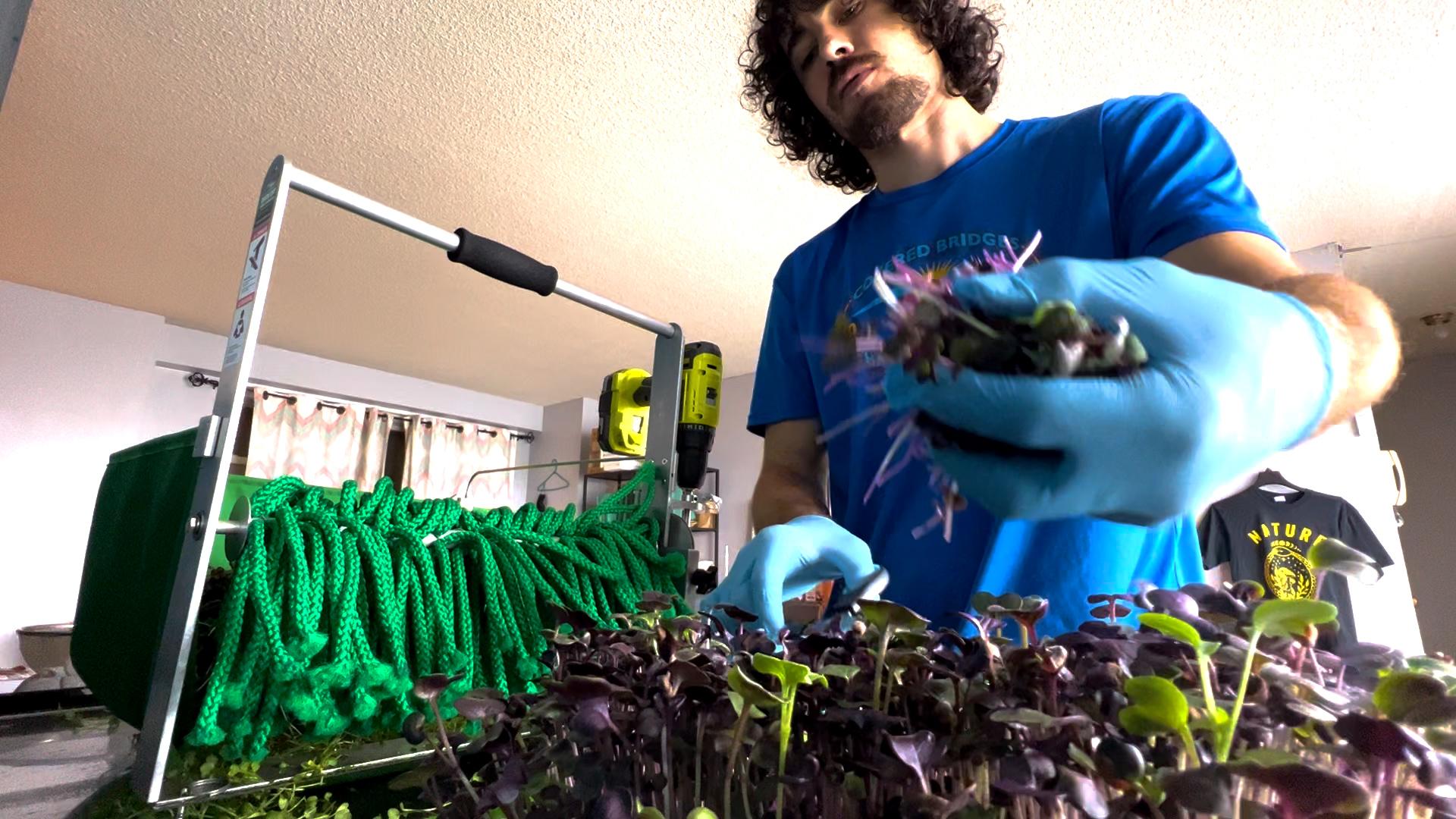The Mi Oh My farm is different from most urban farms. For one thing, it’s indoors: the entire farm is located in a one-bedroom apartment, using hydroponic mats and grow lights to nourish the slender pea shoots and radish sprouts.
It takes only 10 days to produce a crop of microgreens, worker-owner Marc Konkoly said, and they are up to 40 times more nutritious than the mature crops. After harvesting, they will be served at restaurants like the Mottley Kitchen and La Maisonetta in Mott Haven.
Another key difference from most urban farms is that the Mi Oh My is a cooperative, owned and managed directly by the workers who run it. Every major decision, from expenses to growth strategy, is made by a vote of the members. The Allerton apartment itself was offered up by a member who moved away.
Cooperatives may be key to building the wealth of black and brown communities, according to Michael Partis, executive director of the Bronx Cooperative Development Initiative. His organization is focused on creating “economic democracy” by helping cooperatives and other locally-owned businesses flourish in historically disadvantaged communities.
According to Partis, the Bronx initiative works with a “community enterprise network” of around 20 organizations, and around 50 small businesses. Many of those businesses are cooperatives; others are minority-owned businesses with a more traditional ownership structure.
“When other people outside the Bronx are the investors or shareholders, then Bronx workers and Bronx renters are unable to grow their wealth,” Partis explained in a phone call. “Other people are making profits off them.”
In contrast, he said, the profits of a cooperative are more likely to stay within the community, supporting other local businesses.
Cooperatives occupy a small but growing niche in the nation’s economy. In 2021, according to a report by the Democracy at Work Institute, there were 612 worker-owned businesses nationwide, a 30% increase from two years earlier. Collectively, these businesses earned $280 million in gross revenue and employed nearly 6,000 worker-owners.
In 2015, then-Mayor Bill DeBlasio created the Worker Cooperative Business Development Initiative with a $1.2 million budget. In the 12 months ending in June 2021, that Initiative launched 10 new cooperatives, with another 25 in the pipeline.
Worker cooperatives were the focus of a recent panel discussion hosted by the Initiative at Sankofa Haus on Lincoln Avenue. During the event, Partis pointed out a long history of black workers pooling their knowledge and labor to survive in hostile economic conditions.
Cooperative economics and mutual aid played a key role in the development of black economies, Partis said. He pointed out the Black Panthers, who provided breakfast programs and free clinics, and Fannie Lou Hamer, who established a large cooperative farm and “pig bank” to help Black farmers become self-reliant.
Two of the panelists were worker-owners of their own cooperatives. Dalaeja Foreman, a Brooklyn-based artist, is also the founding member of Breadfruit, a woodworking cooperative. Sade Swift is a member of two different cooperatives: Rebellious Root, which provides consulting services, and Cards By De, a card printing company.
One of the challenges facing cooperative business models, panelists agreed, is operating in a financial environment still dominated by legacy institutions.
“Banks often say, ‘It’s difficult to evaluate your business,’” Partis explained. “And so a lot of worker-owners have difficulty accessing capital.”
Another is the difficulty of making decisions in a workplace where every employee is also the boss.
“It’s really important to understand that some processes within co-ops are a little slower,” Swift said. “We’re not Amazon, we can’t get it to you the next day.”
But those are challenges that can be overcome, according to Konkoly, as he finished packaging the greens at Mi Oh My’s indoor farm.
“The owners really have to be self-motivated and find it within themselves to build the organization,” Konkoly explained. “Any founder you have, that’s the process that you have to go through. But in this case, everyone is involved in that process of taking ownership.”

